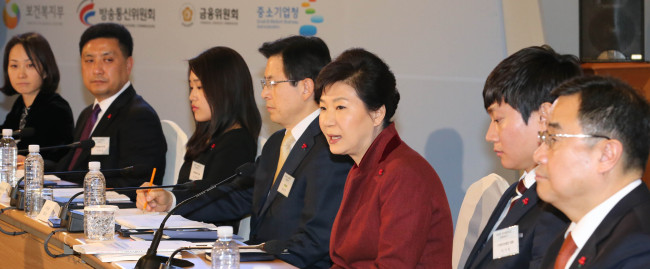W80tr fund to support new industries
Seoul aims to build Asian Silicon Valley in Sangam, Pangyo
By 조정은Published : Jan. 18, 2016 - 17:49
The government said Monday it would inject 80 trillion won ($66 billion) of public funds this year to nurture new growth engines, including smart cars, surgical robots and software content, in the latest attempt to realize its creative economy drive.
In a joint policy report to President Park Geun-hye, relevant ministries said they would build Asian versions of California’s Silicon Valley at Sangam, in Seoul, and Pangyo, in Gyeonggi Province, to embrace more innovative entrepreneurs not only from Korea, but also from overseas. The government also plans to turn 17 Creative Economy Innovation Centers into regional hubs to strengthen partnerships between start-ups and large businesses, and to revitalize the local economy.
The massive investment in creative economy signals a major shift in the government’s support priorities as it had focused on developing heavy industries as the nation’s key growth engines in the past. Such policy decisions were made to better cope with structural changes in the nation’s economy from manufacturing to information and communications technology and software industries, officials said.

“We need to secure the best technologies in the world by making preemptive research and development investments that look ahead into the next 10, 20 years,” said Park after she was briefed by ministers in Pangyo.
“(The government) has to support promising sectors, including cultural content, bio health, tourism and information technology through policy finance and nurture excellent start-ups by expanding (the use of) new growth engine funds as investments,” she said.
Since entering office in 2013, Park has pushed to nurture creative ideas from across society, assimilating them with ICT, science technology and other industries to eventually create new technologies, markets and jobs. Park believes that a creative economy can solve emerging problems, such as income inequality, slowing economic growth and rising youth unemployment.
By rolling out specific and massive investment plans, the government appears to be pushing Park’s creative economy drive in full swing as she enters her fourth year in office this year. Her term ends in early 2018.
Of the total, 90 percent of public funds, or 72 trillion won, will be injected for the creative economy sector -- 49 trillion won in soft loans, 23 trillion won in guarantee insurance and the rest in direct investments. Another 8 trillion won will be spent to cultivate the country’s cultural content, such as computer games, webtoons, character development, film and tourism.
In the briefing session, Park also urged ministers to produce “visible outcomes,” stressing that convergence between cultural contents with information technologies is the key for success of her creative economy drive.
The envisioned Silicon Valley in Sangam-dong, western Seoul, will serve as a provider and marketing station for digital cultural contents that combine creative ideas and stories with virtual reality and computer graphics. Start-ups there will be given opportunities to promote their products and services through hallyu-related events in order to attract foreign buyers, officials said.
Through the Creative Economy Valley in Pangyo, the government also plans to expand support for start-ups eyeing overseas markets and provide education programs and space for them. Like Silicon Valley in the U.S., the government will create a business-friendly environment to attract budding start-ups from overseas and help them settle down.
The plan also includes ways to attract 400,000 foreign patients and expand telemedicine services for patients in rural areas, along with support for domestic drugmakers to expand their presence in the global market.
As part of efforts to boost Korea‘s financial technology drive, the Financial Services Commission plans to expand an online-based automated portfolio service, dubbed as a robo-adviser this year, and provide an integrated bank service that allows users to close their dormant accounts online without having to go to physical banks.
Also, the Korea Communications Commission plans to transmit ultrahigh-definition broadcast content over terrestrial channels for the first time in the world in February next year.
By Cho Chung-un (christory@heraldcorp.com)








![[KH Explains] Hyundai's full hybrid edge to pay off amid slow transition to pure EVs](http://res.heraldm.com/phpwas/restmb_idxmake.php?idx=644&simg=/content/image/2024/04/18/20240418050645_0.jpg&u=20240419100350)






![[From the Scene] Monks, Buddhists hail return of remains of Buddhas](http://res.heraldm.com/phpwas/restmb_idxmake.php?idx=652&simg=/content/image/2024/04/19/20240419050617_0.jpg&u=20240419175937)

![[KH Explains] Hyundai's full hybrid edge to pay off amid slow transition to pure EVs](http://res.heraldm.com/phpwas/restmb_idxmake.php?idx=652&simg=/content/image/2024/04/18/20240418050645_0.jpg&u=20240419100350)

![[Today’s K-pop] Illit drops debut single remix](http://res.heraldm.com/phpwas/restmb_idxmake.php?idx=642&simg=/content/image/2024/04/19/20240419050612_0.jpg&u=)